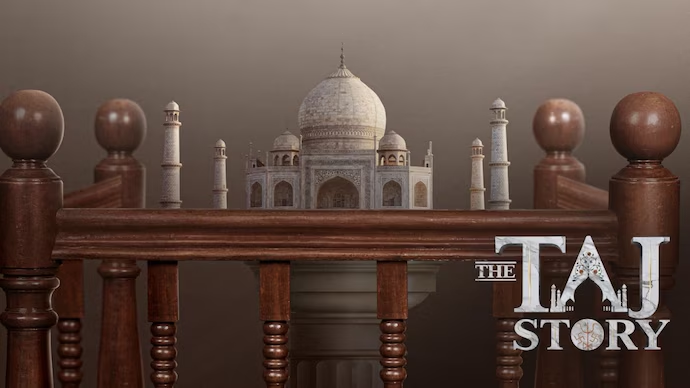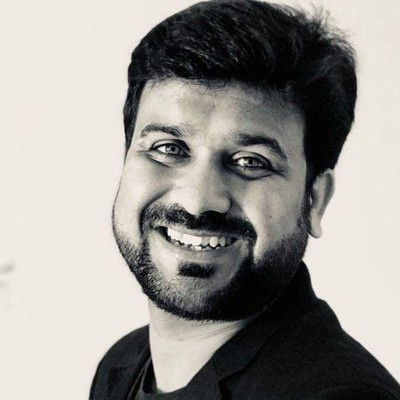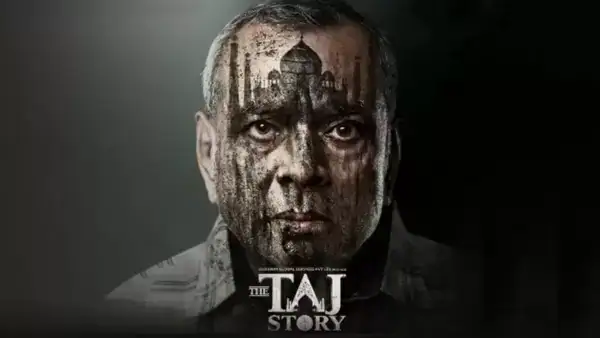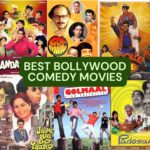There’s a charged energy in cinema when a film decides to question accepted history, stir the pot and invite debate. That’s precisely the aura surrounding The Taj Story Movie, which dropped on 31 October 2025. At its heart – the iconic Taj Mahal and a provocative question—was the monument built by Emperor Shah Jahan or does it hold deeper roots? For the movie-lover in me, that promise of controversy, courtroom confrontation and historical mystery felt like a compelling mix. Yet as I settled in for the nearly three-hour ride, I found myself wrestling with what works, what doesn’t and whether the film delivers more than just questions.
In this blog, we’ll dive into the cast, the plot, the strengths and weaknesses of The Taj Story, look at ratings from critics, reflect on my personal take and draw a conclusion—an honest, fan-to-fan appraisal of a film that wants to shake things up.

The Taj Story Movie Cast
At the centre of The Taj Story is veteran actor Paresh Rawal, playing the role of Vishnu Das—a tour guide-turned-litigant, determined to unearth what he believes is suppressed truth.
Supporting him are Zakir Hussain as the opposing lawyer (advocate Anwar Rashid), Amruta Khanvilkar, Namit Das and Sneha Wagh in key roles.
The creative team sees the film written and directed by Tushar Amrish Goel, produced under Swarnim Global Services Pvt. Ltd.
So, in star-power and premise, The Taj Story has enough to get you curious.
The Taj Story Movie : Plot
Here’s the gist (no major spoilers): Vishnu Das, a local tour guide at the Taj Mahal, becomes obsessed with claims that the celebrated monument may not be what it is conventionally portrayed as. He goes on to file a petition in a court of law, challenging the widely accepted narrative that the monument was built by Shah Jahan for Mumtaz Mahal. Instead he posits the existence of locked 22 rooms under the structure, claims of concealed history and that what we think of as a “symbol of love” may have other origins.
The film unfolds largely as a courtroom drama, peppered with flashbacks, historical commentary, intense dialogues, seismic claims and debates. The teaser and trailer also emphasise: “After 79 years of independence, are we still slaves of intellectual terrorism?”
In short: The Taj Story wants to make you question history, authority, textbooks, accepted narratives.
What’s Good
1. Bold Concept & Debate:
It takes courage in mainstream cinema to provoke big questions about history and heritage, particularly where the monument is as revered as the Taj Mahal. The film’s premise gives it an edge of relevance and intrigue. For a film-lover who enjoys something that challenges the status quo, this is a welcome departure from safe storytelling.
2. Paresh Rawal’s Performance:
Rawal carries much of the film’s weight with a committed portrayal of a guide-turned-avenger. Critics broadly agree he remains the best asset of the film.
His courtroom monologues and body language create some memorable moments, even if the material around him falters.
3. Production Scale & Setting:
The film uses the Taj Mahal (and its environs) as a backdrop effectively, lending authenticity, atmosphere and gravitas. Given the film’s subject, the locations bolster the drama. Also, the trailer’s emphasis on “22 locked rooms below the monument” heightens the mystery.
What’s Not So Good
1. Script & Execution:
Here lies the biggest stumbling block. Nearly every review points to weak writing, digressions, padded scenes and a lack of real focus. As one review noted: “The Taj Story trudges on without offering any real answers to the questions it raises.”
The promise of mystery gives way to long speeches, debates that don’t land, and clichés of courtroom drama that dilute tension rather than build it.
2. Historical Credibility vs Narrative:
The film flirts with controversial theories that many historians have labelled debunked or pseudo-history. This raises issues of balance and credibility—especially for viewers who like their film-facts anchored in research. One reviewer wrote: “Erratic writing is the film’s biggest drawback.”
If your patience for flimsy arguments is low, this may frustrate rather than fascinate.
3. Pacing & Length:
At 165 minutes (nearly 2 ¾ hours) the film overstays its welcome. The courtroom sequences drag, some flashbacks feel needless, and the overall rhythm suffers. Reviewers flagged the runtime as a major issue.
4. One-Dimensional Characters & Debate Tone:
The opposing side in the courtroom is often caricatured, and the female characters, while present, rarely get depth. For example, the focus remains firmly with Vishnu Das’s crusade, making other arcs feel underwritten. Several reviews mention that the film leans hard into rhetoric and heavy dialogues rather than authentic human drama.
Ratings from Top Platforms
- The Indian Express gave The Taj Story 1.5 out of 5 stars, calling it loud but vacuous.
- NDTV rated it 2 out of 5 stars, describing it as “a throw of dice that is all over the place.”
- On social media and through the press, reaction has been mixed: many praise Rawal and the idea, but execution is widely criticised.
Personal View
As someone who loves films that engage with history, question mainstream narratives and force you to think—even after the credits roll—The Taj Story appealed to me immediately. Watching it, I found myself on a ride of curiosity: What if the story we know is incomplete? What if monuments are more layered than we believe? Rawal’s emotive performance hooked me, and the settings of Agra, courtrooms, archival-style sequences created a mood that felt different from your typical Bollywood fare.
Yet by the time the film reached its climactic argument and outcome, I felt the tension had dissipated. The promise of revelation turned into debate, debate into rhetoric, and rhetoric into monologue. While I admire the ambition—the courage to say “let’s question what we’ve accepted”—I couldn’t help feeling these questions deserved a leaner, sharper execution. The film’s length weighed heavily, and many scenes repeated what had already been laid out.
In short: If you go in expecting a gripping, outcome-driven thriller or historical revelation, you may feel a bit let down. But if you’re okay with a film that raises more questions than it answers, and you enjoy hearing a strong lead actor fight his corner, you’ll find moments to appreciate.
One moment that stood out: a montage sequence where Vishnu Das walks through the Mehtab Bagh opposite the Taj at dusk—the light, the reflections, the voice-over about how monuments carry memory. That visual stayed with me. Conversely, several courtroom monologues felt heavy, repetitive, and less cinematic than theatrical.
Conclusion
The Taj Story is a film that will provoke discussion, and that in itself is valuable. It attempts to disturb accepted certainties and invite audiences to look at one of India’s greatest monuments in a new light. For many of us who love historical curiosities, debates and the power of dissent, that is a worthwhile movie-going experience.
But cinema is not just conversation—it’s drama, immersion, craft. On those fronts, The Taj Story falters. With uneven writing, over-lengthy pacing and under-developed supporting arcs, it doesn’t fully deliver the punch it promises.
So here’s my verdict: 2.5 out of 5 stars for ambition, lead performance and mood. 2 out of 5 for execution, pacing and focus. Overall, I’d give it a rounded 2.5 stars. If you’re going in for the idea and Rawal’s performance, go ahead. If you expect slick execution or a neatly resolved historical thriller, temper your expectations.
In a cinema landscape where many films play safe, The Taj Story deserves credit for its boldness. My hope is that it opens more doors—films that ask, “Are we willing to question history?” Even if this one doesn’t totally succeed, the conversation it sparks is what counts in the end.
If you’d like, I can also pull out a detailed list of scene-by-scene highlights, dialogue gems and a watch or skip verdict for you. Would you like that?
For Latest Bollywood Movies Reviews , Please follow Popnewsblend.com

Hi, I’m Prashant Jain — a curious soul, storyteller, and content creator at heart.I’ve always been drawn to the world of entertainment, travel, sports, health & lifestyle — not just as a writer, but as someone who genuinely lives these experiences. Whether I’m binge-watching the latest OTT series, exploring offbeat spiritual destinations in India, or diving deep into wellness routines and cricket match insights, I love sharing what I discover with like-minded readers.
PopNewsBlend is my way of blending personal journeys with meaningful stories — ones that inform, inspire, and keep you ahead of the curve. Everything I write comes from real observations, hands-on experiences, and a deep passion for understanding the world around us.
Discover more from Popnewsblend
Subscribe to get the latest posts sent to your email.







